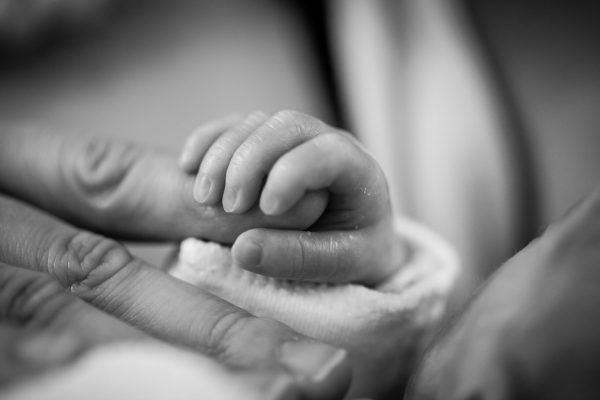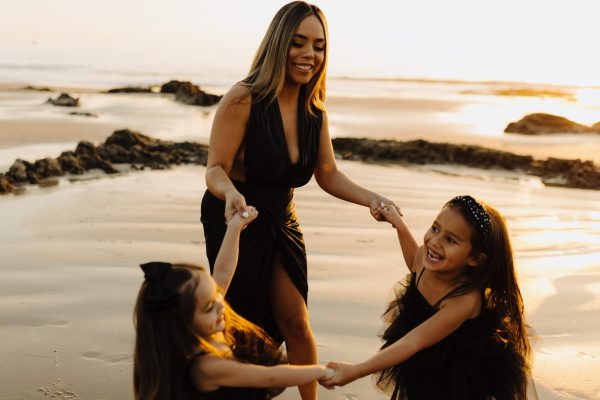This is a ritual we developed, influenced by other similar rituals, to welcome a daughter into the family, community, and covenant. The ritual involves marking the baby’s chest with a letter representing God’s name in a semi-permanent dye, and anointing her ears with oil and lips with wine. What distinguishes this rituals from others most significantly, to my mind, is the visible physical mark that will last for about two weeks, paralleling the physical mark of circumcision in boys. In our culture, where non-ritual circumcision is common, the sign of the covenant marked in boys flesh is not distinguishable later in life as a Jewish identity marker. What remains, as in this ritual, is the memory of the experience of having the covenant, and God’s name marked on one’s body.
Brit Otiyot (Covenant of Letters / Signs) ברית אותיות
| Angel Song | ||
|
B’shem Hashem Elohei Yisrael Miy’mini Micha-el Umil’fanai Uri-el V’al roshi Shechinat El |
ְּבְּשֵׁם ה’ אֱ-לֹהֵי יִשְׂרָאֵל מִימִינִי מִיכָאֵל וּמִלְפָנַי אוּרִיאֵל וְעַל רֹאשִׁי שְׁכִינַת אֵ-ל |
In the name of God, By my right, is Michael before me, Uriel and above my head, Shechinat El |
Parents: In Vayikra Rabbah, the midrash comments that the rule for animals is similar to the rule for people. Just as an animal is allowed a full seven days with its mother before becoming acceptable as a sacrifice on the eighth day, a human child is entered into the covenant only on the eighth day and not before. We have been blessed with a child and the honor of participating with God in the act of creation. We have had the last seven days to think of our daughter as our own, to begin to bond with her, and to revel in our great accomplishment. Today, on the eighth day, it is time to acknowledge God’s role in our simchah and in our daughter’s life. As she comes into relationship with God and the community, this will be one of many steps she will take toward becoming her own person separate from us. We take comfort in knowing that there are both heavenly and earthly angels protecting her as she travels through such transitional moments.
(kvater/in brings in the baby as we sing the Angel Song again)
Assembled Guests: בְּרוּכָה הַבָּאָה Brukhah Haba’ah!
An Honored Guest: This is your chair, Elijah, who returns to children the heart of a parent, and to parents the heart of a child. This is your chair, Elijah. Send your guardian powers to protect this child as s/he strives throughout life to keep the covenant into which we are welcoming him/her today. This is your chair, Elijah. Help all of us to spread the message that the time is coming for the victory over oppression, and that the time is ripe for the arrival of a newborn world of joy.
|
Eliyahu hanavi Eliyahu hatishbi Eliyahu hagiladi Bimherah veyameynu Yavo eleynu Im mashi’akh ben David |
אֵלִיָהוּ הַנָבִיא אֵלִיָהוּ הַתִּשְבִּי אֵלִיָהוּ הַגִלְעָדִי בִּמְהֵרָה בְיָמֵינוּ יָבוֹא אֵלֵינוּ עִם מָשִׁיחַ בֶּן דָוִד |
Elijah the prophet Elijah the Tishbite Elijah the Gileadite Soon in our days May he come to us With Messiah of Davidic line |
(kvater/in places Baby on כסא אליהו Elijah’s chair)
Parent / MC / Honored Guest:
זֶה הַכִּסֵּא שֶׁל אֵלִיָּֽהוּ הַנָּבִיא זָכוּר לַטּוֹב
לִישׁוּעָתְךָ קִוִּֽיתִי ה’. שִׂבַּֽרְתִּי לִישׁוּעָתְךָ ה’, וּמִצְוֹתֶֽיךָ עָשִֽׂיתִי. אֵלִיָּֽהוּ מַלְאַךְ הַבְּרִית, הִנֵּה שֶׁלְּךָ לְפָנֶֽיךָ, עֲמֹד עַל יְמִינִי וְסָמְכֵֽנִי. שִׂבַּֽרְתִּי לִישׁוּעָתְךָ ה’. שָׂשׂ אָנֹכִי עַל אִמְרָתֶֽךָ, כְּמוֹצֵא שָׁלָל רָב. שָׁלוֹם רָב לְאֹהֲבֵי תוֹרָתֶֽךָ, וְאֵין לָֽמוֹ מִכְשׁוֹל. אַשְׁרֵי תִּבְחַר וּתְקָרֵב יִשְׁכֹּן חֲצֵרֶֽיךָ,
Everyone responds:
נִשְׂבְּעָה בְּטוּב בֵּיתֶֽךָ קְדֹשׁ הֵיכָלֶֽךָ.
Nis’b’ah b’tuv beitekha kedosh heikhalekha
May we be sated by the goodness of Your house, Your holy sanctuary
(kvater/in brings baby to Sandek)
Parents: If the baby we had just welcomed into the room were a boy, you would all know what to expect at this moment. While of course we can’t physically remove a foreskin from a girl, the Bible refers to three metaphorical foreskins which seem to represent a spiritual blockage to the proper functioning of the organs to which they are attached.
In Exodus 6:30 Moses protests his appointment as God’s messenger saying, “Behold I am of uncircumcised lips, and how will Pharoah listen to me?” While some commentators hold that Moses was referring to a physical speech impediment, it seems that he has little trouble with speaking. In fact he speaks seemingly endlessly at times. What he is describing seems to be a problem of the spiritual fortitude to speak on God’s behalf, or the confidence in his ability to speak so that people will listen.
Jeremiah, generations later, describes the problem of listening too as one with a metaphorical foreskin: “To whom shall I speak, give warning that they may hear. Behold their ears are foreskinned and they can not listen (6:12).” In a later chapter (9:25) Jeremiah emphasizes that the metaphorical foreskins are as troubling to the covenantal relationship as the physical: “All these nations are foreskinned, but the house of Israel have foreskinned hearts.”
Similarly, in Deuteronomy chapter 30, in the midst of a passage renewing the covenant with all of the Jewish people, God promises: “And Adonay your God will circumcise your hearts and the hearts of your offspring, to love Adonay your God with all your heart and with all your soul, that you may live.”
While we rely on God to remove the spiritual barriers of these metaphoric foreskins, just as we rely on God to imbue the physical circumcision of a boy with meaning, we can create a physical marking of our spiritual intentions, and with God’s help initate our daughter into the covenant. In the Sephardic tradition, women have used henna to mark lifecycle events with a semipermanent physical reminder. The mark of henna on a bride’s hands indicates the change in status she is undergoing and protects her in this liminal state. Because there are some concerns about the safety of henna for infants, we have chosen to mark our daughter with Jagua, a temporary dye made from an Amazonian fruit which is safe for people of all ages.
The male circumcision site is sometimes understood as God’s name signed in the flesh, taking the form of a “י” on the crown of the reproductive organ. Our daughter, too will have God’s name signed in her flesh, in the form a “ש” marked over her heart in jagua and a “ד” and “י”marked on her ears with oil, reminiscent of the anointing oil of the holy Temple. Marking her with the name Shadai invokes the protective and nurturing aspects of God that we hope will be with her throughout her life. Just as the mark of circumcision has bolstered Jewish men’s sense of the holiness of their physical bodies, we hope that our daughter will internalize the mark of Shadai which we place on our her chest today, helping her to know always that there is holiness to be found within her physical being.
The ritual will be concluded by marking her lips with wine, opening them as well to the world of spiritual opportunity.
Mother:
“We mark her heart in hope that her heart will be open to the world and the God behind it.”
(Mark heart with jagua ש – then cover with medical tape to protect from smudging)
“We mark her ears in hope that she will hear the still small voice of God.”
(Mark ears with oil ד – י)
“We mark her lips in hope that they will give voice to God’s presence.”
(Mark lips with wine)
Parents (between marking and taping):
בָּרוּךְ אַתָּה ה’ אֱ-לֹהֵֽינוּ מֶֽלֶךְ הָעוֹלָם, אֲשֶׁר קִדְּשָֽׁנוּ בְּמִצְוֹתָיו, וְצִוָּֽנוּ לְהַכְנִיסָהּ בִּבְרִיתָם שֶׁל אַבְרָהָם אָבִינוּ וְשָׂרָה אִמֵנוּ
Everyone responds:
אָמֵן. כְּשֵׁם שֶׁנִּכְנְסָה לַבְּרִית, כֵּן תִּכָּנֵס לְתוֹרָה וּלְחֻפָּה וּלְמַעֲשִׂים טוֹבִים.
Amen. Kesheym shenikhnesah labrit, kein tikaneis l’Torah u’l’huppah u’l’ma’asim tovim!
As she has entered into the covenant, so may she engage in Torah, the wedding canopy, and good deeds.
(Anonther honored guest takes baby from sandek)
MC / Honored Guest:
בָּרוּךְ אַתָּה ה’ אֱ-לֹהֵֽינוּ מֶֽלֶךְ הָעוֹלָם, בּוֹרֵא פְּרִי הַגָּֽפֶן.
בָּרוּךְ אַתָּה ה’ אֱ-לֹהֵֽינוּ מֶֽלֶךְ הָעוֹלָם, אֲשֶׁר קִדַּשׁ יְדִיד מִבֶּֽטֶן, וְחֹק בִּשְׁאֵרוֹ שָׂם, וְצֶאֱצָאָיו חָתַם בְּאוֹת בְּרִית קֹֽדֶשׁ. עַל כֵּן בִּשְׂכַר זֹאת, אֵל חַי, חֶלְקֵֽנוּ, צוּרֵֽנוּ, צַוֵּה לְהַצִּיל יְדִידוּת שְׁאֵרֵֽנוּ מִשַּֽׁחַת, לְמַֽעַן בְּרִיתוֹ אֲשֶׁר שָׂם בִּבְשָׂרֵֽנוּ. בָּרוּךְ אַתָּה ה’, כּוֹרֵת הַבְּרִית.
Praised are You, Adonay our God, Ruler of the universe, who creates the fruit of the vine.
Praised are You, Adonay our God, Ruler of the universe, who sanctified our beloved patriarch from the womb, and imprinted God’s law in his flesh, and sealed his descendants with the sign of the holy covenant. Therefore, in recognition of this, Living God, our Portion, our Rock, ordain that this beloved child’s flesh and spirit be protected from all harm, for the sake of the covenant which God placed in our flesh. Praised are You, Adonay who establishes the covenant
MC / Honored Guest:
אֱ-לֹהֵֽינוּ וֵא-לֹהֵי אֲבוֹתֵֽינוּ, קַיֵּם אֶת הַיַּלְדָה הַזֹּאת לְאָבִיהָ וּלְאִמָּהּ, וְיִקָּרֵא שְׁמָהּ בְּיִשְׂרָאֵל (פלונית בת פלוני ופלונית). יִשְׂמַח הָאָב בְּיוֹצֵא חֲלָצָיו וְתָגֵל אִמָּהּ בִּפְרִי בִטְנָהּ, כַּכָּתוּב: יִשְׂמַח אָבִֽיךָ וְאִמֶּֽךָ, וְתָגֵל יוֹלַדְתֶּֽךָ. וְנֶאֱמַר: “בְּרִית עוֹלָֽם בֵּינִי וּבֵין֙ בְּנֵי יִשְׂרָאֵל א֥וֹת הִוא לְעֹלָם” וְנֶאֱמַר: “זֹאת אוֹת־הַבְּרִית אֲשֶׁר־אֲנ֣י נֹתֵן בֵּינִי֙ וּבֵינֵיכֶם” וְנֶאֱמַר: “וְהָיָה֙ לְא֣וֹת בְּרִית בֵּינִי וּבֵֽינֵיכֶֽם” הוֹדוּ לַה’ כִּי טוֹב, כִּי לְעוֹלָם חַסְדּוֹ.
Everyone repeats:
הוֹדוּ לַה’ כִּי טוֹב, כִּי לְעוֹלָם חַסְדּוֹ. Hodu Ladonay ki tov, ki l’olam hasdo
MC / Honored Guest:
הוֹדוּ לַה’ כִּי טוֹב, כִּי לְעוֹלָם חַסְדּוֹ.
Everyone repeats:
הוֹדוּ לַה’ כִּי טוֹב, כִּי לְעוֹלָם חַסְדּוֹ. Hodu Ladonay ki tov, ki l’olam hasdo
MC / Honored Guest:
(פלוני בת פלוני ופלונית) זוֹ הַקְּטָנָה גְּדוֹלָה תִּהְיֶה, כְּשֵׁם שֶׁנִּכְנְסָה לַבְּרִית, כֵּן תִּכָּנֵס לְתוֹרָה וּלְחֻפָּה וּלְמַעֲשִׂים טוֹבִים.
(MC / Honored Guests, Parents and Baby drink wine)
Zo hak’tanah g’dolah tihyeh – זוֹ הַקְּטָנָה גְּדוֹלָה תִּהְיֶה – May this little one become great
MC / Honored Guest: Our God and God of our ancestors, sustain this child with the help of her parents, and let her be known among the people of Israel as (plonit daughter of ploni and plonit, or plonit plonit ploni-ploni). May the father rejoice in the product of his loins and the mother delight in the fruit of her womb as it is written, “May your father an mother rejoice and she who gave birth to you exult”(proverbs 23:25). And it is written: “An eternal covenant between Me and the people of Israel, an everlasting symbol.” (Exodus, 31: 16-17) And it is written: “This is the mark of the covenant that I place between Me and you.” (Genesis 9:12) And it is written: “And it shall be a sign of the covenant between Me and you.” (Genesis 17:11) Praise Adonay, for God is good, God’s love is everlasting. Praise Adonai, for God is good, God’s love is everlasting. (Psalms 118) May Plonit daughter of Ploni and Plonit, this little one, become great. As she has entered into the covenant, so may she engage in Torah, the wedding canopy, and good deeds.
Parent(s): Give naming speech
MC / Honored Guest:
מִי שֶׁבֵּרַך אִמּוֹתֵינוּ שָׂרָה רִבְקָה רָחֵל וְלֵאָה וּמִרְיָם הַנְּבִיאָה וַאֲבִיגַיִל וְאֶסְתֵּר הַמַלְכָּה בַּת אֲבִיחַיִל הוּא יְבָרֵךְ אֶת הַנַעֲרָה הַנְעִימָה הַזֹאת בְּמַזָּל טוֹב וּבִשְׁעַת בְּרָכָה. וִיגַדְּלָהּ בִּבְרִיאוּת שָׁלוֹם וּמְנוּחָה לְתוֹרָה וּלְחֻפָּה וּלְמַעֲשִׂים טוֹבִים. וִיזַכֶּה אֶת אָבִיהָ וְאֶת אִמָּהּ לִרְאוֹת בְּשִׂמְחָתָהּ בְּבָנִים וּבָנוֹת עֹשֶׁר וְכָבוֹד דְּשֵׁנִים וְרַעֲנַנִּים יְנוּבוּן בְּשֵׂיבָה וְכֵן יְהִי רָצוֹן וְנֹאמַר אָמֵן.
May God who blessed our mothers Sarah, Rivkah, Rachel, and Leah, Miriam the prophet, Avigail, and Queen Esther, bless this lovely girl at this favorable and blessed hour. May she grow in health, peace, and tranquility and be raised to a life of Torah, the wedding canopy, and good deeds. May her parents merit to see her joyful, blessed with children, prosperity, and honor, bringing fulfillment and refreshment to their old age. May this be God’s will. Amen.
Parents:
רִבּוֹנוֹ שֶׁל עוֹלָם, יְהִי רָצוֹן מִלְפָנֶיךָ, שֶׁתְּהֵא חֲשׁוּבָה וּמְרֻצָה וּמְקֻבֶּלֶת לְפָנֶיךָ, כְּאִלוּ הִקְרַבְנוּהָ לִפְנֵי כִסֵא כְבוֹדֶךָ. וְאַתָּה, בְּרַחֲמֶיךָ הָרַבִּים, שְׁלַח עַל יְדֵי מַלְאָכֶיךַ הַקְדוֹשִׁים נְשָׁמָה קְדוֹשָׁה וּטְהוֹרָה לְבִתֵּינוּ הַנִחְתְּמָה עַתָּה בְּשִׁמְךָ הַגָדוֹל וְהַקָדוֹשׁ, וְשֶׁיִהְיֶה לִבָּהּ פָּתוּחַ כְּפִתְחוֹ שֶׁל אוּלָם, בְּתוֹרָתְךָ הַקְדוֹשָׁה, לִלְמֹד וּלְלַמֵד, לִשְׁמֹר וְלַעֲשׂוֹת. וְתֶן לָהּ אֲרִיכוּת יָמִים וְשָׁנִים, חַיִים שֶׁל יִרְאַת חֵטְא, חַיִים שֶׁל עֹשֶׁר וְכָבוֹד, חַיִים שֶׁתְּמַלֵא מִשְׁאֲלוֹת לִבָּהּ לְטוֹבָה. אָמֵן, וְכֵן יְהִי רָצוֹן.
Master of the Universe, may it be Your will that she be worthy, favored, and acceptable before You, as if we had offered her before the throne of Your glory. May You, in Your abundant mercy, send through your holy angels a holy and pure soul to our daughter who has just been inscribed with Your great name, and may her heart be as open to Your holy Torah as the entrance to the Sanctuary, to learn and to teach, to observe and to fulfill. Bestow upon her length of days and years, a sin-fearing life, a life of abundance and honor, a life in which her heartfelt wishes are filled for the good. Amen, and so may it be Your will.
MC / Honored Guest:
יְבָרֶכְךָ ה’ וְיִשְׁמְרֶךָ.
יָאֵר ה’ פָּנָיו אֵלֶיךָ וִיחֻנֶךָּ.
יִשָׂא ה’ פָּנָיו אֵלֶיךָ וְיָשֵׂם לְךָ שָׁלוֹם.
May God bless you and protect you.
May God’s face shine on you and be gracious to you.
May God lift the divine presence to you and bring you wholeness and peace
|
Hamal’akh hagoel oti mikol ra Y’varekh et han’arim V’yikarei vahem sh’mi V’shem avotai Avraham v’Yitzkhak V’yidgu larov B’kerev ha’aretz |
הַמַלְאָךְ הַגֹאֵל אֹתִי מִכָּל-רָע יְבָרֵךְ אֶת-הַנְעָרִים וְיִקָרֵא בָהֵם שְׁמִי וְשֵׁם אֲבֹתַי אַבְרָהָם וְיִצְחָק וְיִדְגוּ לָרֹב בְּקֶרֶב הָאָרֶץ |
May the angel who has redeemed me From all harm Bless the children may they be called by my name And the names of my fathers Abraham and Isaac And may they multiply like fish Upon the earth |
(Parents / MC invite guests to festive meal)












